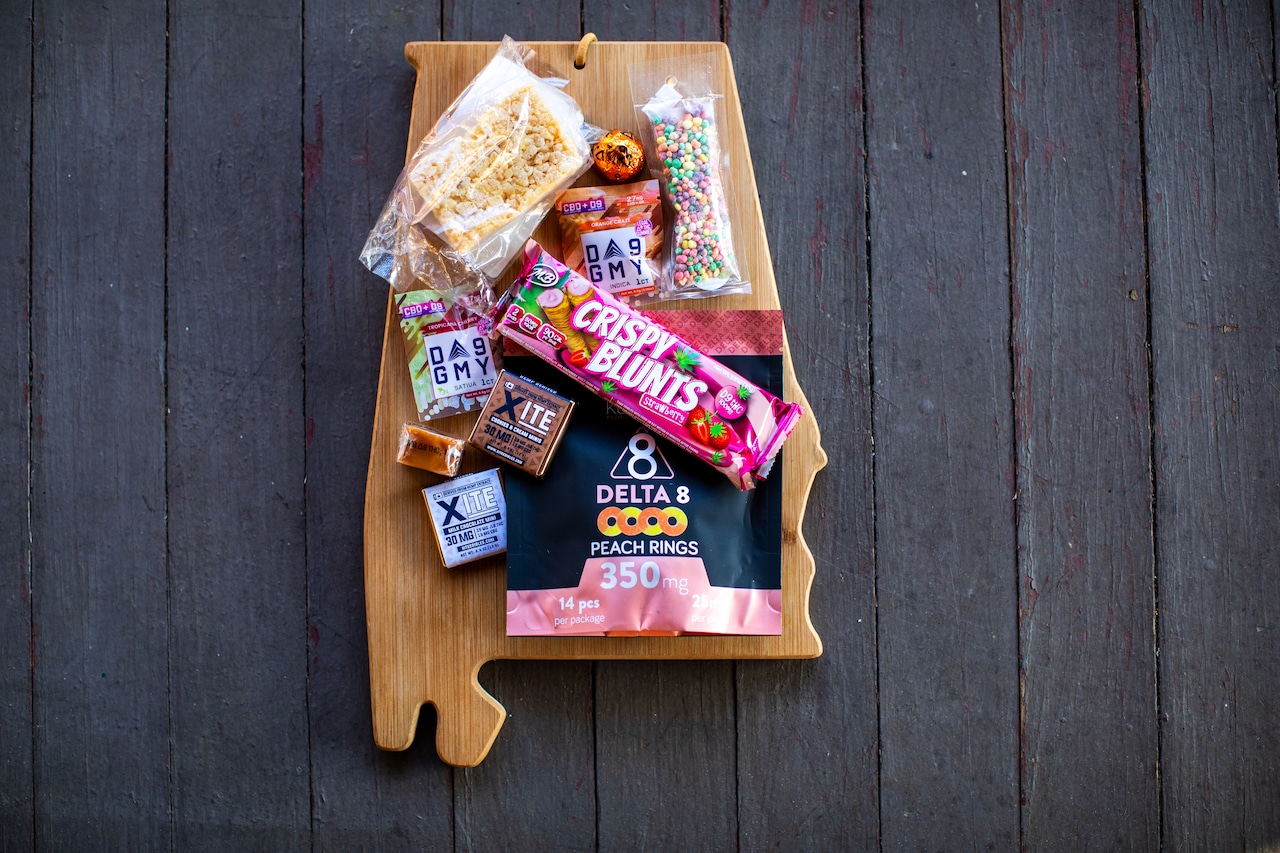Need assistance getting a cannabis business license? Schedule a Free Consultation
This story is published as part of the series Highly Legal in partnership with The Examination, a nonprofit newsroom that investigates global health threats, and AL.com, PennLive and USA TODAY. Our team is continuing to report on new cannabis products and we want to hear from you. Share your experience or questions with us here.
After Alabama failed to launch medical marijuana for the third time, it was fair to ask: Will legal marijuana ever come to Alabama?
But here’s the reality. It’s already here – or something very much like it.
While nearly half of all states now allow recreational marijuana, half still don’t. And what’s taken hold in many of these states instead is a massive market of store-bought gummies and vapes, a wave of delta-8 and delta-9 and THC-A OK’d through a federal farm bill and now lining gas stations and smoke shop shelves with seemingly legal highs. But what is in these products? Do they work? Can you trust them?
A review by AL.com, The Examination, a nonprofit newsroom that investigates global health threats, and The Milwaukee Journal Sentinel found that customers, parents, merchants, regulators, lawmakers and even public health experts are struggling to keep up with this new class of products — and that understanding, and oversight, has lagged far behind sales.
“It’s a big human guinea pig experiment with a lot of these substances,” said Patrick Cournoyer, who leads the U.S. Food and Drug Administration’s cannabis product committee. “And that, of course, in and of itself, should be alarming.”
And in Alabama, the little understood and brightly packaged products have been catching the unsuspecting off guard. Especially children and seniors.
Down in Alabama
Lawmakers in Alabama don’t want kids to get their hands on medical marijuana. It’s one of the reasons they’ve moved so slowly to license pot farms and dispensaries.
In 2023, they even created a requirement that all medical marijuana gummies be peach-flavored on the theory that’s less appealing to children. Spot the difference between delta-8 and delta-9Bill Schulz for Milwaukee Journal Sentinel
But while Alabama slow-played the rollout of highly regulated medical marijuana, products made from its less regulated chemical cousins, delta-8 and more recently delta-9, have cropped up across the state. In gas stations, vape shops, liquor stores and more, bags of gummy bears and sour candies all made with hemp-derivatives are spreading with few restrictions.
Nationwide, sales of these products climbed to nearly $3 billion in 2023.
Many people report positive experiences with the products, using them for recreation, to curb panic attacks, alleviate pain, and – one of the most common applications – as a sleep aid. But doctors at Alabama’s largest hospital noticed a rise several years ago in patients with hallucinations who reported using delta-8. Delta-8, delta-9 and THC-A products have flooded into U.S. states that don’t allow the legal sale of marijuana. The recreational use of marijuana is not legal in Alabama, however, you can find storefront signs, like this one pictured in Birmingham, Alabama, advertising the sale of those products which are legal.Tamika Moore/AL.com
Psychiatrists Dr. Badari Birur and Dr. Chelsea Miller of the University of Alabama at Birmingham said in one month they saw a dozen patients at UAB for complaints related to delta-8. Doctors advise people with schizophrenia and psychosis to steer clear of marijuana, but no such warning exists for delta-8.
Birur and Miller shared details from three delta-8 cases in a paper published in 2021 in Frontiers of Psychiatry. In one, Miller said: “His mom had given him some gummies because he was having insomnia and she thought she was doing something good for him.” The 23-year-old man with no history of violence and well-controlled mental illness went wild with delusions, breaking his mother’s arm when he said he was trying to arrest her.
Last year, Alabama restricted the sale of delta-8 to people 21 and older and required shops to place products behind the counter. The restrictions do not limit online sales.
What is delta-8?
Things changed in 2018 when the federal Farm Bill legalized products made from hemp with low levels of delta-9 THC. That’s the main psychoactive ingredient in marijuana.
Starting with low-THC hemp, which is legal under the Farm Bill, manufacturers use acids to extract delta-8 and similar high-THC compounds from the plant. The resulting high-THC solution is added to gummies and other products, and is supposed to be diluted enough by the gelatin or other ingredients that the final product contains less than 0.3% THC. But there is no verification that companies’ dosing claims are accurate.
Other variations on the THC molecule have emerged, including delta-10, HHC, THCa and more. Delta-8 isn’t as strong as regular THC, but some products contain high concentrations of the substance that can produce feelings of anxiety, paranoia and even delusions.
Virginia Guy, executive director of the Drug Education Council in south Alabama, became concerned about delta-8 after several high-profile incidents in south Alabama involving kids. In February, a group of teens vaping in a movie theater had to be taken to the hospital for bad reactions.
“A lot of people feel like delta-8 is not quite as strong as delta-9,” said Guy. “But then, that’s like drinking whiskey versus beer. You just drink more liquid, but you still get drunk.”
Suddenly delta-9 candies and vapes are also crowding shelves in Alabama. Delta-9 is the exact same psychoactive molecule found in marijuana. But these new products are derived from hemp plants and refined in ways that producers believe adheres to the Farm Bill.
No guarantee of safety
But none of these hemp-derived products are regulated by the FDA, and experts say they can be made anywhere from a seller’s basement to a factory.
In testimony before the U.S House of Representatives Committee on Oversight and Accountability last week, FDA Commissioner Robert Califf said that a “new regulatory regime” is needed. Delta-8 and delta-10 products seen in April at CBD American Shaman Menomonee Falls in Menomonee Falls, Wis. Jovanny Hernandez / Milwaukee Journal SentinelJovanny Hernandez / Milwaukee Journal Sentinel
In states like New York, legal marijuana products must carry a certificate of analysis, a document that shows the product has been tested for heavy metals and pesticides. In some states, hemp-derived products face no such requirement. When certificates are voluntarily provided, they can’t always be trusted.
“The most important thing people should know is that there is no guarantee of safety,” said Adie Rae Wilson Poe, a neuroscientist at Legacy Research Institute in Oregon, who is studying the role of cannabinoids in pain relief. “There’s no guarantee that it doesn’t have any other toxins like pesticides, or heavy metal, or residual solvents.”
For now, the official response very much depends on where people live. And it can be confusing. In Colorado, which long ago legalized marijuana, it is illegal to make or sell delta-8 products. Ten other states have banned the sale of delta-8 and some other hemp products, according to MJBizDaily, a cannabis news site.
In almost two dozen states, there are no clear regulations or bans in place. In Wisconsin, where marijuana remains illegal, there isn’t even a minimum age for purchase of delta-8.
Six states, including Arizona, have attempted to regulate hemp-derived products within their legal marijuana markets.
Jonathan Miller, general counsel of the U.S. Hemp Roundtable, the most active industry trade group, said the FDA should do more to regulate his industry. He characterized the status quo as a “continuing source of frustration.”
“Many hemp companies use good manufacturing practices that promote safe products,” said Miller. “Some bad apples don’t.”
In an interview with The Examination, Cournoyer of the FDA called the prevalence of psychoactive hemp products a “major public health issue.” The agency has sent warning letters to a handful of manufacturers, including some that made unproven medical claims.
“The FDA is doing what it can with the authority that it has,” he said. “We really do think that a solution is needed, and legislation on this matter could be that thing.”
Meanwhile, producers continue to develop and market new cannabinoids that haven’t been systematically screened or tested.
“We’ve kind of got a standstill, and we are hoping that at some point Congress will pass legislation that will require FDA to start looking at these products,” said MiIller. Until then, he said , the U.S. Hemp Authority has announced a certification program to “ensure they are produced with good manufacturing practices and are not marketed or sold to children,” Miller said.
Candy or cannabinoid?
America’s Poison Centers, which represents 55 poison control centers around the U.S., logged more than 8,000 delta 8-related calls from 2021 to 2023. Nearly a third involved children under 6 years old.
Although that number is far lower than the 89,295 reported for exposures to cleaning products, it has been rising every year since 2021.
Starting in 2022, the Alabama Poison Information Center also began closely tracking calls about delta-8. They recorded 200 calls in 2022 and 235 in 2023. About a third of the calls involved kids younger than 6 years old, said clinical director Jessica Pescatore. Delta-8 exposure by ageThe Examination
Those young children often get their hands on gummies and become very ill, Pescatore said. The recommended dose for adults of delta-8 gummies might be one quarter to one half of an item. But kids who confuse them for regular candy often eat several, she said. While some kids become sleepy and confused, others may require intensive care or experience hallucinations that can last days.
“We’ve had a couple patients requiring supplemental oxygen,” Pescatore said. “The really, really extreme cases, we’ve had patients have to be intubated and placed on a breathing machine.”
Some products come packaged in ways that are almost identical to candy or other sweet snacks and can pack a surprising dose.
In one complaint from 2020, a woman in Wisconsin bought CBD oil and said she was given a free package of what looked like Sour Patch Kids candy. That night, her two young children went in her purse and ate the candy. The mother and her husband took their children to the hospital. The police later learned the gummies had 500 mg of THC in them — five times the legal amount for edibles in most states with recreational marijuana.
Delta-8 products are also growing in popularity among teens. In a recent survey of 2,000 high school students, 11% said they had used delta-8 in the last 12 months.
According to the survey published by NIH, delta-8 use was more common in states without marijuana legalization or delta-8 regulations.
Mike Smith, CEO of the Alabama Sheriff’s Youth Ranches, said he’s become alarmed at the number of times some of the 75 foster children in his care have used delta-8 vapes. Recently there was an incident when a 14-year-old became uncharacteristically belligerent.
“Most of our young people have never been intoxicated and it’s tough,” Smith said. “Some can take it and be fine. But for some, the meanness comes out of them.”
But others welcome the sale of marijuana-like compounds.
“We hear stories every day about the use of these products to help people sleep, help with common aches and pains,” said Miller with the Hemp Roundtable. “We hear about elderly folks using these products to help promote joint health. There are so many different applications for these products and that’s why they’re so popular.”
But with little regulation and no assurance of purity, customers often rely on shopkeepers and each other to estimate and guess the correct dosage.
“I went into a shop in the Panhandle of Florida,” said Guy with the Drug Education Council in south Alabama. “I said, ‘I’m not sleeping well, how would you tell me to use this?’ He said, ‘Take this gummy, but just eat a little of it and see what it does to you.’ It’s all just experimental and it’s all just guesswork.”
Ashley Okwuosa is a reporter for The Examination. Amy Yurkanin is a senior reporter for AL.com. John Diedrich is an investigative reporter for The Milwaukee Journal Sentinel. Highly Legal is a reporting collaboration about new cannabis products, produced in partnership with AL.com, Milwaukee Journal Sentinel, PennLive and USA TODAY.




